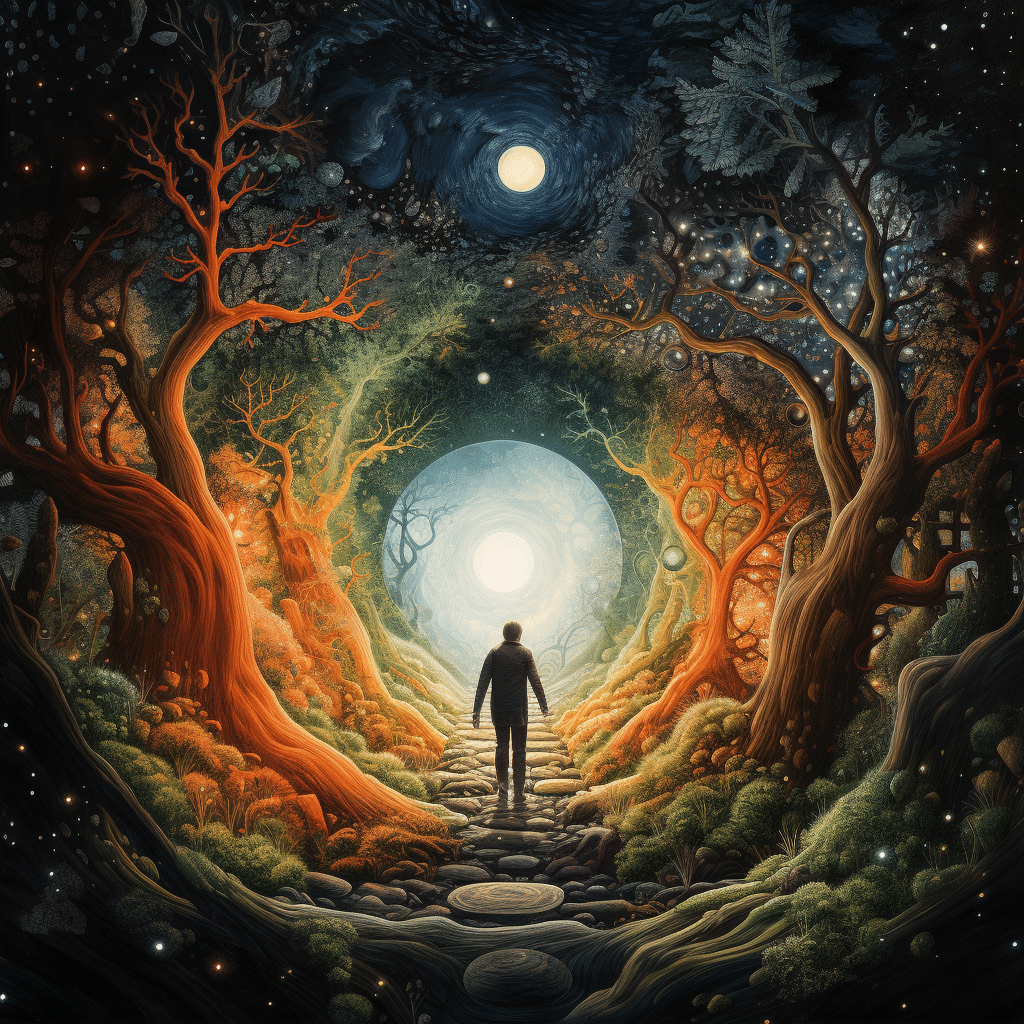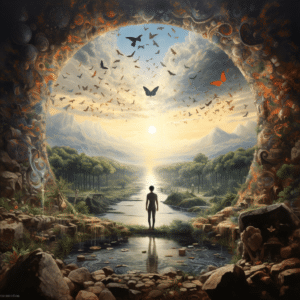
Existence is being present in the world, without any real effect or understanding. Whereas life is about taking part in the world around us, existence is simply being there. It’s essential to differentiate between them, as they explain our perspective of reality.
Looking further into this thought, life is about the dynamic combination of physicality, consciousness and emotions. It includes growth, learning, joy, love, pain – all elements that add to our experiences’ richness and depth. Existence indicates a more idle state, with no involvement in these layers of life.
Plus, life can be seen as a continuous quest with the possibility for personal growth and realisation. Each second offers a chance to take on new things and widen our understanding of ourselves and the planet we exist in. Existence has no such transformative power, as it often implies a static state – a mere onlooker, not an active participant.
To get a better understanding of this division, we can look to historic philosophies like Buddhism. The Buddha accentuated life’s impermanence and ever-changing nature, while stressing the importance of alertness and engagement in making our reality.
To summarise, life wraps up being alive with its bright mix of feelings, experiences and desires. Existence reminds us that being present does not always mean living completely or truly engaging with our environment. By distinguishing between them, we can aim for a more meaningful life – one where our time is not just passed, but enriched by meaningful connections and personal development.
Definition of Life and Existence

They both refer to being, but in different ways. Life is everything from microbes to humans, while existence is anything that exists – living or not.
Life has attributes such as growth, reproduction, adaptation and response to stimuli. It’s a dynamic process of change and development. From birth to death, living beings go through many stages and experience emotions, sensations and perceptions. Life is a journey of experiences with the world.
Existence is simply being present. It includes living organisms but also things like rocks, rivers and stars. These don’t necessarily involve growth or reproduction, and can be static.
What sets life apart is consciousness. Living beings are aware and can perceive their surroundings, make decisions and experience emotions. This gives life its depth and complexity. It allows us to reflect on our own existence and ponder life’s meaning.
Philosophical Perspectives on Life and Existence
Philosophers and thinkers throughout history. These perspectives offer insights into our being. Life is not simply being alive, but a phenomenon with physical, emotional, intellectual, and spiritual parts. Life is thoughts, feelings, desires, relationships, and aspirations. Existence is being in the world. It is through life that existence becomes meaningful.
Existentialists stress freedom and responsibility in creating meaning in an absurd universe. Ancient Greek philosophers had their own views: Plato saw life as a prison, while Aristotle said actualizing potential leads to a fulfilling life.
The Difference in Meaning
Essence, purpose, and experience set them apart.
Life is dynamic, with a purpose of fulfillment. Its experience is vibrant.
Existence is static, focused on survival. Its experience is monotonous.
The Experience of Life vs. Existence
Life is distinct from mere existence. It is a colorful array of moments, emotions, and connections that make us feel alive. It is a mix of joys and sorrows, challenges and triumphs which shape our individual paths. Existence, in contrast, is the mere fact of being, void of significance or depth.
Life brings us purpose and gratification. Here we become involved in our passions and form meaningful relationships. Laughter, tears, love, and growth all come with life’s moments. It is an ever-changing voyage that teaches us and continuously allows us to redesign ourselves.
Existence is a shallower state. It is the outcome of bodily processes that trigger awareness. Existing means being physically here but not necessarily engaging with the surrounding world or experiencing its beauty and complexity.
While existing is a state of being, life is an energetic involvement in the wonders and problems that are around us. Through life, we can unlock our potential, make lasting memories, and leave a lasting effect on others.
It is essential to remember that merely existing does not equate to having a satisfying life. Lots of people can pass through their days mechanically, not embracing all life has to offer. According to psychologist Carl Rogers, “What matters most is what kind of person you become in your experiences.”
The Impact of Life and Existence on Society

The power of life and existence on society is great. Life is the source of our emotions – joy, anger, love, and fear. It leads us on a path of self-discovery and growth. Existence is more than individual experiences. It influences history, with each generation adapting, innovating, and evolving.
Life’s influence can be seen throughout history. The Renaissance was a time of artistic expression. Shakespeare’s plays and Michelangelo’s art are a testament to life’s impact on humanity.
They permeate every aspect and form the fabric of our beliefs and actions. Life brings emotion, purpose, and relationships. Existence influences history and helps societies transform. Together, life and existence create a powerful force in society.
Conclusion
What differentiates life from mere existence? This article delved into this perplexing question. We contemplated consciousness, purpose, and the relationship between biology and philosophy.
Life is much more than existing. It is full of experiences, emotions, and connections. This vitality gives life its energy. Through insight and self-awareness, individuals can find their passions and pursue their goals with enthusiasm. On the other hand, existence may just involve going through the motions without meaning or joy.
Life also happens through relationships. The people we are close to shape our experiences and help us grow. These bonds offer support, understanding, and love – all of which enliven life. Existence, in contrast, does not provide such chances.
Humankind has long tried to define the essence of life. Ancient philosophers, as well as contemporary researchers, have explored the contrast between life and mere existence. These endeavors show humanity’s determination to comprehend life’s nature.
To sum up, life is more than biology or routine. It encourages us to find meaning beyond survival. Passion, relationships, and development are essential parts of a fulfilling life.
Throughout history, there have been various views on the contrast between life and mere existence. This invites us to reflect on what it means to live. Let us stay curious and explore life’s endless possibilities.
Frequently Asked Questions
FAQ 1: What Is the Difference Between Life and Existence?
Answer: Life refers to the state of being alive, characterized by growth, reproduction, and the ability to respond to stimuli. Existence, on the other hand, is a broader term that encompasses the state of being, whether it is alive or not. While life involves biological processes, existence is a more general concept that can include both living and non-living entities.
FAQ 2: Can Inanimate Objects Also Exist?
Answer: Yes, inanimate objects can also exist. Existence is not limited to living organisms alone. Inanimate objects, like rocks or buildings, exist in the sense that they occupy space and have a physical presence, even though they do not possess the characteristics of life such as growth or reproduction.
FAQ 3: How Does Life Differ from Existence in Terms of Consciousness?
Answer: Life often involves consciousness, which refers to the state of being aware and perceiving one’s surroundings. While all living beings have the potential for consciousness, existence does not necessarily require consciousness. Inanimate objects exist without being conscious of their own existence.
FAQ 4: Is Life Essential for Existence?
Answer: No, life is not essential for existence. Existence can be independent of life. Inanimate objects, such as celestial bodies or non-living entities, can exist without having the attributes of life. Life is just one form of existence, but not the sole criterion for something to exist.
FAQ 5: Can Existence Exist Without Life?
Answer: Yes, existence can exist without life. In fact, the universe existed for billions of years before the emergence of life. Existence is a fundamental concept that encompasses various forms, including non-living entities. Life is just one aspect of existence, but existence itself is not contingent upon the presence of life.
FAQ 6: Are Life and Existence Interconnected?
Answer: Life and existence are interconnected to some extent. Life is a specific form of existence that involves living organisms. However, existence is a broader concept that encompasses more than just life. While life requires existence, existence can exist independently of life. So, while there is a connection between the two, they are not synonymous.






